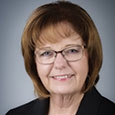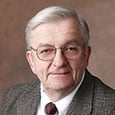
Zeeland, North Dakota is a town of under 100 people. If you call Zeeland Public Schools and ask to speak to the superintendent, librarian, elementary music teacher, principal, choir director, or band director, you will be speaking to Trudy Fraase Wolf. She is also a wife, mother, and private piano teacher. In her spare time, she is a board member for Phi Beta Mu and active in the North Dakota Music Educators Association, American Choral Directors Association, National Band Association, and International Double Reed Society. She also plays in the Bismarck Wind Ensemble, the West River Winds, and the Missouri River Community Band. She has spent her career “blooming where she was planted.” Unexpected career turns have taken her to rural North Dakota where she has created a culture of musical excellence in a school with a current enrollment of 26 in grades Pre-K-12. Following her 2021 Midwest Band clinic, dozens of directors lined up to meet her and learn more about developing a successful band program at a small school. Her program serves as a model for success, no matter the size.
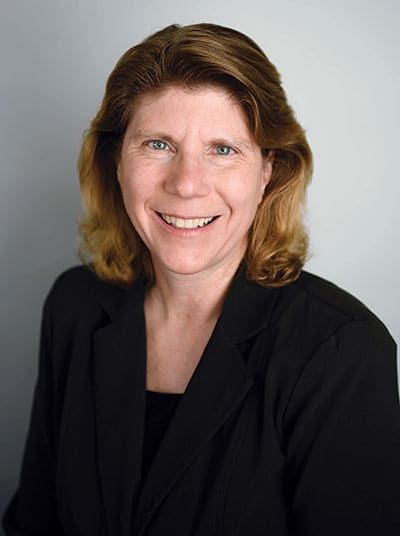
Did you always want to be a teacher when you were growing up?
My parents were teachers, but I hoped to become a nurse or a park ranger. By my senior year in high school, several families asked me to give their kids piano lessons. I turned them down initially because I was just a high school student, but they wanted their kids to study with somebody they knew. Teaching piano was so exciting. I loved seeing the progress students made each week. As I prepared for college, I wanted to stay involved in music, playing my oboe, participating in band, and singing in choir. I had the epiphany that teaching would keep me connected to music. I decided to go into education and planned to teach in a K-12 school, but I took a detour to pursue an oboe performance career.
How did your teaching career begin?
I have lived in Zeeland since 1993, but grew up in Wahpeton and Dickinson, North Dakota. I earned a Bachelor of Science in Music Education from Dickinson State University and a Master of Music in oboe performance from the University of Illinois. I tried to land a job at a four-year college but everywhere I applied, they wanted five years of public-school teaching experience, so I returned to North Dakota to begin my five years. At the same time, I earned a Master of Science in Music Education from the University of Illinois, hoping it would lead to the doctorate. In the meantime, I married a farmer and knew I wasn’t going anywhere.
How would you describe Zeeland?
Zeeland has a population of about 86 based on the 2020 census. It was about 197 when they counted in early 1990s. We are approximately 100 miles from Bismarck and 100 miles from Aberdeen. Some other towns are closer, but all have a population under 1,000. Almost everyone is in farming or working for a business supporting farming. We have had some new arrivals – people who have reached retirement age and want to live in a quiet, small town that reminds them of their childhood. The most famous musician from this area is Lawrence Welk. His farmstead and a museum about his life are located in Strasburg.
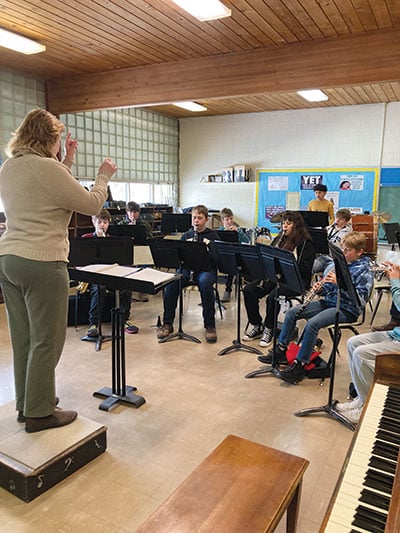
What was your teaching load when you came to Zeeland?
I taught all of the music classes – elementary music, beginning band, second-year band, 7-12th grade band, junior high choir, high school choir, and general music. It was a full-time job. In North Dakota, it is not uncommon for a single music teacher to cover all of the classes in a small school.
What other jobs did you take on over the years?
For most of my time at Zeeland, I have been the librarian, a job I really like. After beginning band class, it was always nice to go to the quiet of the library. I knew that members of the administration were approaching retirement age, so I decided to get an administration degree. I soon added elementary principal to my duties. Then, the superintendent, who also served as the high school principal, announced, “I am going to retire. I will keep my superintendent job part-time, and Trudy, you can be the high school principal.” Things were getting pretty busy.
A few years later, he fully retired and told the school board, “Trudy can be the superintendent, too.” I said, “No, Trudy cannot be the superintendent, the high school principal, the elementary principal, the librarian, and the music teacher, but we do have someone on staff with the credentials to be the principal.” For a while, I was able to give up the principal part. Last year, I had to take that back because we couldn’t find anyone to fill that position. This year, we do have someone, so I am the principal only as needed.
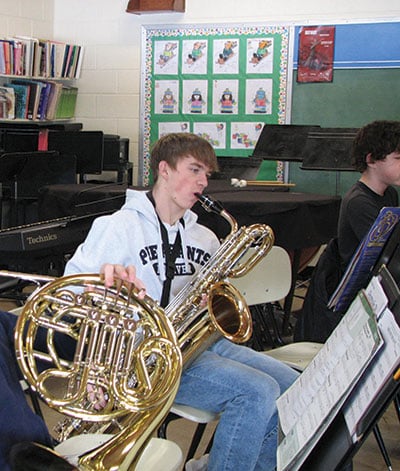
With all of your responsibilities, I have never heard you complain about how hard the job is or that your kids can’t do something. You always give them the best musical experience possible. What activities are your band students involved in during the year?
We give four concerts a year. That’s more than many schools, but when I came to Zeeland, they had had no music performances the year before. They had assigned an English teacher who didn’t want the job to teach music, and that teacher told students they were too small to do anything so there were no concerts. The community really did not like that. My first contract stated that there would be four concerts a year, and I stayed with that. I encourage students to play in as many honor groups as they can because that gives them band experience. I don’t call our group a band. I call it an ensemble because it more accurately reflects what we do.
I have a 7th-12th grade band with a range of abilities, so that limits how difficult the music can be. For those upper players, honor bands offer a chance to play more difficult literature. We attend the Ployhar Band Festival, and Northern State University in South Dakota (100 miles away) runs a band clinic one day each fall that we can take everybody to. We also audition for two more events in North Dakota at Minot State and Dickinson State for band and choir.
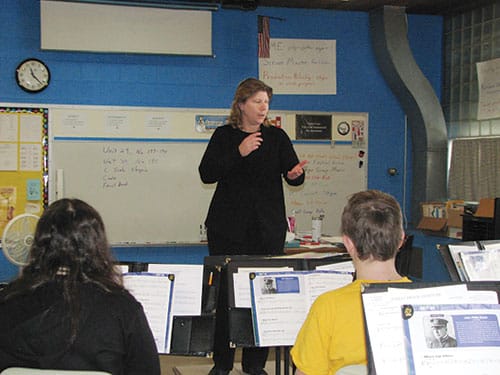
There is always junior and high school All-State. I don’t often get students into those, but it happens every great while. In 2022-23 I had two high school students make All-State, and this year one junior high student made it. I am working on getting a double horn for him. If he is good enough to play in All-State, I have to get him a double horn.
What about solo and ensemble festivals?
All students in the elementary grades have to learn a solo every year. I try really hard to convince them to play their solos at the elementary music festival at Mandan. Almost everybody does perform, and some play duets and trios. The same is true at the high school level. I try to keep us as busy as possible.
In 2021, you gave a clinic at the Midwest called Mind the Gap, and it was phenomenal. After it ended, dozens of people lined up to talk to you because they related to your situation. You ended your talk with a recording of your band, and it was so good. How have your made the Zeeland players so successful?
To start off with, I have these students from preschool through 12th grade. I have all those years to work with them. In elementary school, I have a fairly rigorous curriculum to teach reading and writing music. We do a lot of composing. By the time they start band, they already know all the basics of reading music. All we are doing is working on getting the best sound we can and the physical mechanics of the horn. We carefully work on balance and blend and making a nice sound.
I work hard to have as balanced an instrumentation as possible given the numbers. In the springtime, I teach a unit on timbre, which is particularly important for the 3rd and 4th graders who will be starting band soon. We go over all of the instruments. I freely talk about instrumentation and what we need. I tell them, “If there is an instrument you really want to play, go for it.” If they are undecided, I may encourage them to consider instruments that need more players. Over the years, I have usually had really balanced groups. I have never ended up with all saxophonists and drummers.
I remember one year when I came to hear your students, the high school band had only four students. It wasn’t a crazy instrumentation, but it wasn’t ideal either. They were playing wonderful music well, and the ensemble was well balanced. You were doing flex arrangements before it was even invented.
As we rehearse the pieces, obviously we have gaps in instrumentation. I pay attention to SATB more than what instrument is playing. I make sure there is a melody somewhere. If we are missing the instrument that plays the melody, I rewrite the music for somebody. It is even better if I can find it in some other part, so I don’t have to do much rewriting. If there is a missing trumpet part, for example, I might give the melody to the clarinet and say, “From this number to this number, play the trumpet part and then come back to your part. My kids are used to reading off two or three sheets of music.
If I need to fill in some missing percussion, I may give a wind instrument a cowbell or triangle part to play during their rest. Students always like that. Then, if I do a mix and match, we are not afraid to try several different combinations to see what sounds best. Right now I have nine in the band, including a drummer, and I have Quartets for All (Alfred Music). That might be two kids on each part, although that depends on the balance of the instruments. The alto sax is a fairly loud instrument so it might take a part all by itself to get the balance I want.
Do you have any advice on working with elementary school teachers for those who rely on them feeding students into the high school music program?
This is not just a music question – it affects all subjects. I will put on my administrator hat for a minute. I have worked as a lead evaluator for the company that handles school accreditations for North Dakota schools and many schools around the world. One topic we look at when evaluating schools is vertical alignment within each subject. This happens through things like curriculum mapping where you lay out the topics covered in each grade, so you know what students are learning as they come up. If the music teachers in the system know that 3rd grade students learn all the treble clef notes or whatever, it makes it easier to develop a logical, sequential curriculum.
Even as the only music teacher in my community, I have the curriculum written down for each grade. What fluctuates so much for me is the number of students in a grade. My curriculum has to be more fluid depending on enrollment. By the time students reach high school band, I do not have it as precisely planned because it depends on what students can play. I keep an eye on whether we did a piece in a particular key or style, so they are exposed to a variety.
You recently shared with me a phrase that has become a motto throughout your career. Can you tell me how you first learned the phrase and what it means to you?
At vacation bible school in the mid-1970s, it was popular to make banners – cutting out letters from felt and gluing them on to canvas. We were each assigned a saying, and I didn’t understand mine. It had to be explained to me: Bloom Where You Are Planted. I know now that it means don’t wish for what you don’t have. Do the best where you are. I still think about these words almost every day. My musical journey hasn’t been what I planned or hoped for when I was younger. I expected to teach in a bigger high school, have my big band, and maybe teach at a college. Being in a small school and doing everything myself has been hard sometimes, especially in the early years. Once I realized that this job was going to be it – it wasn’t a stepping stone – I sometimes felt discouraged.
I would attend the state conference or festival and see the bigger bands performing and think, “My band is never going to be up there.” The groups from Fargo or Bismarck had lots of people travelling with them, and I would be there by myself. I felt like an impostor at the events because I wasn’t in one of those big programs. I was just teaching at a little school with my handful of kids. Sometimes, I felt it didn’t qualify me as a real band director. In those moments, I reminded myself to bloom where I am planted and do my best with the situation I am in.
How do you share that with your students to give them a feeling of success, even in a small program?
When I first started, some students had a negative point of view about our program. I had to work on it deliberately because they did think, “We’re just Zeeland, it doesn’t matter. We’re just a little band.” I never accept that and always hold them to a high standard. If something isn’t good enough (in rehearsal), I tell them that, and we keep working to make it better. Sometimes I tell students that because I was into sports in high school, I like to win, I like to be the best. Therefore, we will do all these things. I have done this long enough now, however, that it isn’t a question.
I am sure that at your school every kid is into everything because the school is so small. A lot of young directors struggle with sharing students with other teachers. What have you learned about sharing your students?
I don’t bump up against other activities much because I don’t schedule any afterschool band rehearsals. Our school is small enough that all of the sports teams practice elsewhere. They go off to other area schools for various sports and don’t return home until 7:30 at night. Concerts can be difficult to schedule because we cooperate with one set of schools for one sport and a different set of schools for another sport. (Because the area schools are so small, some athletic teams require combining students from multiple schools.) Finding a day with no sports to schedule a concert is a little tough. Some of the schools ask me what day I want to have a concert, and they try to avoid planning a conflicting event.
In my classes I often steal students from other classes because I might need a piano player to play for the kids, or we need to record an audition. If another teacher wants to borrow a student out of band or choir, unless it is the day of a concert, I let them go. I stole some of their time and owe them a little time back. I have never felt like it has to be band or nothing, perhaps because I was involved in so many sports and music. I would have hated giving up any of that. If you make students choose between music and other activities, they might give up music altogether.
What is your best advice and wisdom for directors working in small schools?
I turned my husband down the first time he asked me to marry him. It was too soon, and I wasn’t sure if I could live here for the rest of my life. After we married, I decided that even though this was where I was going to live, it did not mean it was where I centered all of my life. I purposely chose to do things at the state level so it wasn’t just me and Zeeland. I served as a officer in state associations, traveled to the Midwest Clinic, and went to American Choir Directors Association regional conferences. These activities made me feel less isolated and more connected to a much larger community. I really encourage people to stay connected at the state level.
As for helping students, make your planning very intentional. Think about what you want them to know when they are at the end of their school career with you. It won’t happen accidentally along the way. You have to think about how you will get there.
* * *
Trudy Fraase Wolf has worked in public school education for 30 years and is a music teacher, librarian, elementary principal, secondary principal, and superintendent with the Zeeland Public School in North Dakota. She joined the Advance Ed team (now Cognia) in 2016 as an engagement review team member and became a Lead Evaluator in 2017. She has published in The Double Reed Journal, The Chorister, and the North Dakota Music Educator’s Journal and has presented at the Midwest Clinic and the North Dakota Music Educator’s Conference. She has served as a clinician for the NSU Band Clinic and as a judge for the Dickinson 5-8 music festival and the Federated Music Clubs piano festivals. Fraase Wolf has earned degrees from Northern State University, the University of Illinois, and Dickinson State University.

